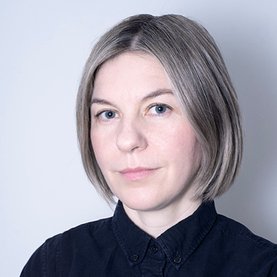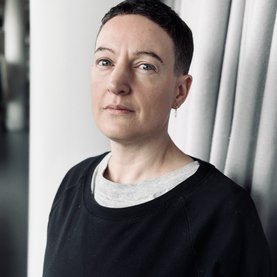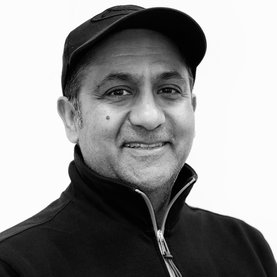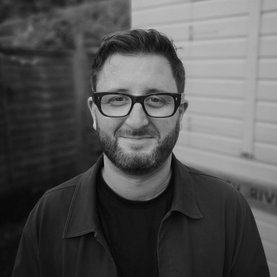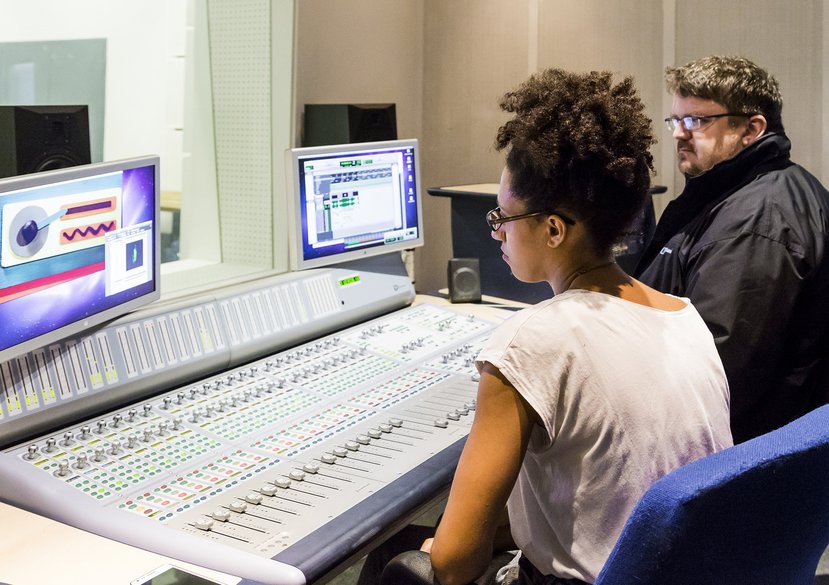
Overview
Media and storytelling in the digital era
Key details
- 180 credits
- 1 year programme
- Full-time study
School or Centre
Location
- White City
Next open event
Application deadline
- 14 Aug 2024
Career opportunities
- Transmedia content creators
- Digital designers
- Activists
- Experience designers
- Speculative storytellers
- VR developers
- Educators
- Sound artists
Develop a deep understanding of critical and experimental media production, creation and design practice.
Digital Direction focuses on inclusive and relevant storytelling, exploring emerging technologies like VR, AR, AI, games engines and mobile platforms. We inspire communication practitioners to approach contemporary communication critically and find meaningful ways to tell stories. We welcome arts practitioners, journalists, writers, musicians and others interested in experimenting with new narrative approaches driven by ethical, environmental, epistemological and social imperatives. You’ll use emerging storytelling tools critically, collaborating to share important stories.
You might develop research-led communication strategies addressing urgent urban housing needs and environmental threats. Or collaborate with communities to create augmented documentaries, social VR experiences, or explore machine-generated narratives. Investigate human and nonhuman intelligence, engage with political or intercultural issues, or experiment with storytelling guided by nature.
We seek diverse creative and critical practitioners passionate about storytelling for positive change. Join us and foster an inclusive practice, leverage emerging media's power, and unlock new storytelling possibilities for the benefit of all.
Applications for the September 2024 intake are open and will be assessed on a rolling basis. Programmes will close for applications when the maximum number of places have been awarded, or at the final deadline on 14 August, 12 noon (UK time).
Find out more about this programme
Catch the replays from our latest online Open Day.
Gallery
Staff
Facilities
The School of Communication is currently located on our White City site.
View all facilitiesOur mixed-use studios encourage collaborative working, thought, awareness and action. In addition, you have access to craft and technical workshop areas and excellent technical support in the College.
Our alumni
Our alumni form an international network of creative individuals who have shaped and continue to shape the world. Click on each name to find out more.
Where will the RCA take you?More details on what you'll study.
Find out what you'll cover in this programme.
What you'll cover
How will I learn?
There will be several opportunities to collaborate with others, but at a minimum, your programme will include 283 contact hours and 1517 independent study hours. Contact hours can consist of lectures, seminars, tutorials, critical forums and workshops, among other types of teaching delivery.
Your programme's Teaching types include briefings, projects, tutorials, seminars, lectures, critical forums, technical inductions, technical workshops, offsite visits and blended learning.
Programme structure
The programme is delivered across three terms and includes a combination of programme, School and College Units.
Term 1
During Critical Stories (45 credits), we will explore the foundational approaches of the programme, focusing on critical, cooperative and experimental storytelling methods, media ecologies and artefacts. We introduce you to diverse concepts and practices relevant to contemporary storytelling, media and communication during the unit. Working with others, we ask you to assemble a project that proposes, tests and evaluates inclusive forms of digital storytelling practice, using responsive methods to explore contexts and raise the visibility of urgent concerns in contemporary culture.
Across terms 1 and 2, you will participate in AcrossRCA.
Term 2
Making Worlds with Others (15 credits) is a School-wide unit will allow you to work alongside students within and across the School. Working from the perspective of your practices and disciplines, you will develop a project that engages with others and creates mutual exchanges of ideas and understandings to create critically engaged situations and outcomes resulting in convivial knowledge exchange. Through collaborative learning and making, the unit will support you in understanding knowledge exchange and public engagement and how to situate your practice in these territories. The unit will also ask you to question how socially engaged practice can contribute to cultural understanding, co-researching and co-creating methods for knowing with not knowing about.
Immersive Enquiries (30 credits) focuses on working critically and experimentally with immersive environments, mobile platforms, and emerging areas of media practice to conceptualise, test and evaluate future directions. During the unit, we ask you to produce a prototype for an immersive storytelling environment and mobile platform that looks critically and collectively at real-world concerns and to collaborate with others to explore the changing effects of interactive time-based media on human communication, behaviour and experience.
Term 3
The Independent Research Project (60 credits) allows you to work independently to develop a comprehensive programme of research-led practice, critically exploring a topic of your choosing through individual or collaborative approaches. The unit provides scope for you to bring together the core competencies, methods and processes you have developed during the programme and to define, contextualise, produce and evaluate a substantial body of creative and critical research. During the unit, we ask you to engage responsibly with storytelling perspectives and research methods and to address real-world concerns inclusively within your work. You will also be encouraged to hone your research, professional and leadership skills, articulate your future direction, and show how your practice contributes to debates at the forefront of the field.
AcrossRCA
AcrossRCA is a compulsory 30-credit unit which is delivered as part of all MA programmes.
Situated at the core of your RCA experience, this ambitious interdisciplinary College-wide unit supports you in responding to the challenges of complex, uncertain and changing physical and digital worlds. Developed in response to student feedback, AcrossRCA creates an exciting opportunity for you to collaborate meaningfully across programmes.
Challenging you to use your imagination and intellect to respond to urgent contemporary themes, this ambitious unit will provide you with the opportunity to:
- make connections across disciplines
- think critically about your creative practice
- develop creative networks within and beyond the College
- generate innovative responses to complex problems
- reflect on how to propose ideas for positive change in local and/or global contexts
AcrossRCA launches with a series of presentations and panel discussions from acclaimed speakers who will introduce the themes and act as inspirational starting points for your collaborative team response.
Delivered online and in-person across two terms, the unit has been designed to complement your disciplinary studies and to provide you with a platform to thrive beyond graduation.
Requirements
What you need to know before you apply
Candidates are selected entirely on merit and applications are welcomed from all over the world. The selection process considers creativity, imagination and innovation as demonstrated in your portfolio, as well as your potential to benefit from the programme and to achieve high MA standards overall.
You will normally have completed an undergraduate qualification in a relevant subject or be able to evidence equivalent professional experience in fields such as filmmaking, broadcasting, media and communication, fine art, graphic design, sound, music, illustration, theatre, writing, HCI or digital production.
All candidates are required to submit an online portfolio of work to be assessed by the programme team; see below for more detail.
Candidates are selected on the basis of a body of work that demonstrates an advanced understanding of the subject and sufficient technical skill to realise intentions, evidence of commitment to the subject, intellectual curiosity, open-mindedness, the ability to collaborate, to engage in debate and respond to criticism, and the ability to engage in sustained and consistent study. We also look for enthusiasm for your practice and a strong sense of personal responsibility for your own learning and development.
What's needed from you
Portfolio requirements
You should upload up to five pieces of work which evidence your match and potential for meeting the aims of our programme. We expect to see evidence of great interest in using technology to push the boundaries of storytelling, as well as the ability to bring a critical perspective to the hype surrounding such technologies.
Please include a short statement about each piece of work in the space provided and if any of the pieces of work involve collaboration please describe your contribution to the work too.
We welcome career changers, if you do not have a technical or time-based media background, please also explain how and why you want to expand your work into these areas.
Video requirements
You must submit a video of no more than two minutes as part of the application process.
In this video, please tell us why you want to join the programme:
- What stories do you want to tell?
- What ambitions do you have for your work?
- How can technology specifically enhance the stories you want to tell?
- What critical and conceptual perspectives will you bring to your studies?
- Which theoretical or philosophical ideas and texts have advanced your understanding of storytelling, media and technology today?
- What ideas interest you and why?
English-language requirements
If you are not a national of a majority English-speaking country you will need the equivalent of an IELTS Academic or UKVI score of 6.5 with a 6.0 in the Test of Written English (TWE) and at least 5.5 in other skills. Students achieving a grade of at least 6.0, with a grade of 5.5 in the Test of Written English, may be eligible to take the College’s English for Academic Purposes course to enable them to reach the required standard.
You are exempt from this requirement if you have received a 2.1 degree or above from a university in a majority English-speaking nation within the last two years.
If you need a Student Visa to study at the RCA, you will also need to meet the Home Office’s minimum requirements for entry clearance.
Fees & funding
For this programme
Fees for new students
Fees for September 2024 entry on this programme are outlined below. From 2021 onward, EU students are classified as Overseas for tuition fee purposes.
Home
Overseas and EU
Deposit
New entrants to the College will be required to pay a non-refundable deposit in order to secure their place. This will be offset against the tuition fees.
Home
Overseas and EU
Progression discount
For alumni and students who have completed an RCA Graduate Diploma and progress onto an RCA Master's programme – MA, MA/MSc, MFA, MDes, MArch, MEd or MRes – within 10 years, a progression discount of £1,000 is available.
* Total cost is based on the assumption that the programme is completed in the timeframe stated in the programme details. Additional study time may incur additional charges.
Scholarships
Scholarships
The RCA scholarship programme is growing, with hundreds of financial awards planned for the 2024/5 academic year. Examples of financial awards offered in 2023/24 are given below.
The Deputy Vice-Chancellor’s International Scholarship
For: All MA programmes, MArch, MFA, MDes, MRes & MEd
Eligibility criteria: Students from Australia, Bangladesh, Canada, Colombia, Cyprus, Egypt, France, Germany, Greece, Hong Kong, India, Indonesia, Ireland, Israel, Italy, Japan, Lebanon, Malaysia, Mexico, Nigeria, Pakistan, Poland, Portugal, Saudi Arabia, Singapore, South Korea, Spain, Sri Lanka, Switzerland, Taiwan, Thailand, Turkey, UAE, USA
Eligible fee status: Overseas fee status
Value: £7,000 towards fees
The Deputy Vice Chancellor’s EU Scholarship
For: All MA programmes, MArch, MFA, MDes, MRes & MEd
Eligibility criteria: Students from Austria, Belgium, Bulgaria, Croatia, Cyprus, Czech Republic, Denmark, Estonia, Finland, France, Germany, Greece, Hungary, Iceland, Italy, Latvia, Liechtenstein, Lithuania, Luxembourg, Malta, Netherlands, Norway, Poland, Portugal, Romania, Slovakia, Slovenia, Spain, Sweden, Switzerland, Turkey
Eligible fee status: Overseas fee status
Value: £7,000 towards fees
The Deputy Vice-Chancellor’s UK Scholarship
For: All MA programmes, MArch, MFA, MDes, MRes & MEd
Eligible fee status: Home fee status
Value: £5,000 towards fees
The RCA UK Disabled Students’ Scholarship
For: All MA programmes, MArch, MFA, MDes, MRes & MEd
Eligibility criteria: Students who identify as D/deaf or disabled
Eligible fee status: Home fee status
Value: £6,000 for living costs
Sir Frank Bowling Scholarships
For: All programmes excluding PhD & short courses
Eligibility criteria: Black or Black British Caribbean, Black or Black British African, Other Black Background, Mixed - White and Black Caribbean, Mixed - White and Black African
Eligible fee status: Home fee status
Value: Full fees & maintenance
The Vice-Chancellor’s UK Cost of Living Scholarship
For: All MA programmes, MArch, MFA, MDes, MRes & MEd
Eligible fee status: Home fee status
Value: £5,000 for living costs
House of Fraser Bursary
For: Any MA programme
Eligible fee status: Home fee status
Value: £10,000 towards fees
Applying for a scholarship
You must hold an offer to study on an RCA programme in order to make a scholarship application in Spring 2024. A selection of RCA merit scholarships will also be awarded with programme offers.
We strongly recommend that you apply for your programme as early as possible to stand the best chance of receiving a scholarship. You do not apply directly for individual awards; instead, you will be invited to apply once you have received an offer.
More information
Additional fees
In addition to your programme fees, please be aware that you may incur other additional costs associated with your study during your time at RCA. Additional costs can include purchases and services (without limitation): costs related to the purchase of books, paints, textiles, wood, metal, plastics and/or other materials in connection with your programme, services related to the use of printing and photocopying, lasercutting, 3D printing and CNC. Costs related to attending compulsory field trips, joining student and sport societies, and your Convocation (graduation) ceremony.
If you wish to find out more about what type of additional costs you may incur while studying on your programme, please contact the Head of your Programme to discuss or ask at an online or in person Open Day.
We provide the RCASHOP online, and at our Kensington and Battersea Campuses – this is open to students and staff of the Royal College of Art only to provide paid for materials to support your studies.
We also provide support to our students who require financial assistance whilst studying, including a dedicated Materials Fund.
External funding
There are many funding sources, with some students securing scholarships and others saving money from working. It is impossible to list all the potential funding sources; however, the following information could be useful.
Payments
Tuition fees are due on the first day of the academic year and students are sent an invoice prior to beginning their studies. Payments can be made in advance, on registration or in two instalments.
Start your application
Change your life and be here in 2024. Applications now open.
The Royal College of Art welcomes applicants from all over the world.
Before you begin
Make sure you've read and understood the entrance requirements and key dates
More information about eligibility and key datesCheck you have all the information you need to apply.
Read our application process guideConsider attending an Open Day, or one of our portfolio or application advice sessions
See upcoming sessionsPlease note, all applications must be submitted by 12 noon on the given deadline.
Ask a question
Get in touch if you’d like to find out more or have any questions.






